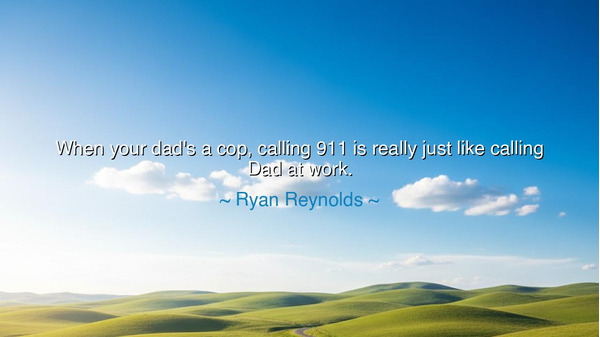
When your dad's a cop, calling 911 is really just like calling






The words “When your dad’s a cop, calling 911 is really just like calling Dad at work,” spoken by Ryan Reynolds, carry within them a deep blend of humor, truth, and quiet reverence. Beneath the wit lies the heart of a child’s understanding of duty — that for some, the line between family and service is as thin as a whisper. Reynolds, in his playful way, unveils a profound truth about the nature of sacrifice, courage, and the inheritance of responsibility. When your father’s calling is to protect others, his work is not merely a profession — it becomes a light that shines into the heart of the family, shaping the child’s sense of the world, of danger, and of what it means to stand between chaos and peace.
To call 911 is, for most, an act of desperation — a plea for help when the world has turned dangerous or uncertain. Yet, for the child of a police officer, that number carries a different meaning. It is the echo of protection made personal, the embodiment of safety within the familiar image of a father. In that simple line, Reynolds captures a paradox: the one who belongs to the world also belongs to his family, yet his duty to the world often pulls him away from them. The father who answers the cries of strangers is the same man who once answered the nighttime fears of his child. Thus, the quote becomes a reflection on how service transforms love into public duty, and how children of such people learn early that heroism often comes at the cost of presence.
In ancient times, such fathers were known as guardians of the city, men who stood at the gates while others slept. The Greeks called them phylakes, and the Romans honored them as custodes. Their task was not glorious — it was wearying, endless, and often unthanked — yet civilization itself depended upon them. Just as the watchman of Athens or the centurion of Rome once bore the burden of keeping the night safe, so does the modern officer bear the same responsibility. To grow up under such a figure is to live with the shadow of danger and the light of pride intertwined. It is to know that your father’s labor is not only for your safety, but for the safety of countless others who will never know his name.
And yet, within this noble calling lies a quiet grief. The child of a protector often learns early that love must share space with duty. For every night the officer comforts another family, his own family waits in silence, watching the clock. In Reynolds’ words, there is a tone of both affection and distance — the humor that masks understanding. It is the same gentle irony one finds in those who grew up loving someone whose heart belonged partly to the world. The child learns that courage is not just the act of facing danger, but the endurance of separation, the ability to carry on even when one’s father is always a little farther away than home.
This theme echoes across history. Consider Marcus Aurelius, emperor and philosopher, whose reign demanded endless labor and sacrifice. His letters to his son Commodus reveal a man torn between love and duty — a ruler whose care for his people left little time for his own family. Or think of the firefighters who ran into the burning towers on that fateful morning in September, knowing that some would never return to their children. Their courage mirrors the same spirit Reynolds honors, however playfully: the idea that to serve others is to accept that one’s own family will share in that sacrifice. Every act of protection requires a quiet partner — the spouse, the child, the loved one — who learns to live with the uncertainty of waiting.
What makes Reynolds’ quote so poignant is that it humanizes the myth of the hero. It reminds us that every protector, no matter how brave, is also a parent, a son, a human being whose work cannot be left at the door. The humor in his words disarms the listener, but the truth within them endures: that for the child of a guardian, the extraordinary becomes ordinary. The sound of a siren is not only a call to danger — it is the sound of a father at work. The badge, the uniform, the patrol car — these are not distant symbols of authority, but extensions of love rendered in duty.
So let us take from Reynolds’ reflection this lesson: to serve others is to belong to more than oneself, and to love someone who serves is to share that belonging. We should honor those who stand between us and harm, not only for their courage, but for the invisible cost their families bear each day. And for those of us who are not called to such professions, let us still live as guardians in our own way — protectors of kindness, keepers of peace, rescuers of one another. For the spirit of the protector is not confined to those who wear a badge; it lives in every heart that answers when the world cries out for help. And perhaps, in some quiet way, that is what it truly means to “call Dad at work.”






AAdministratorAdministrator
Welcome, honored guests. Please leave a comment, we will respond soon